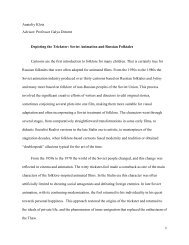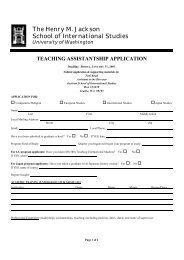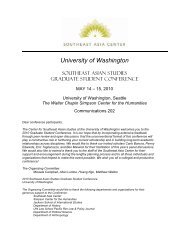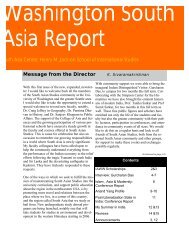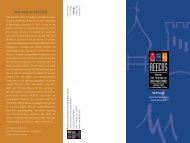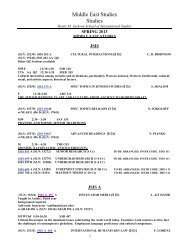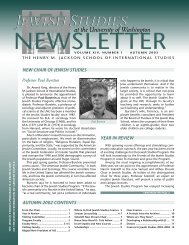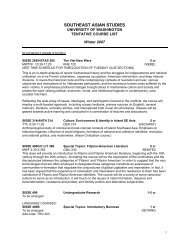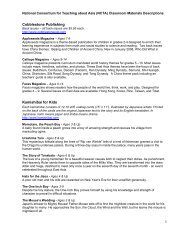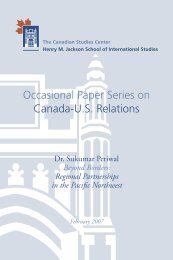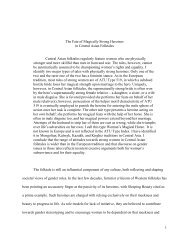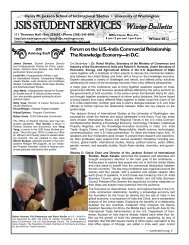canadian studies center canadian studies center - Usc - University of ...
canadian studies center canadian studies center - Usc - University of ...
canadian studies center canadian studies center - Usc - University of ...
Create successful ePaper yourself
Turn your PDF publications into a flip-book with our unique Google optimized e-Paper software.
8<br />
SPRING QUARTER COURSE FOCUS<br />
Graduate Research Team Explores Sustainability Performance in Canada,<br />
the US and Beyond<br />
by DOROThy paun, pROfessOR anD sTuDenTs sean cappellO, kaTie fulkeRsOn, lauRa pOllan, Ravi ManGhani, caROlyn chen,<br />
anGie Gaffney, bRianna nOel huGhes, eRic knOben, viOleTa ORlOvic, elizabeTh TRan, anD eMil MORhaRDT<br />
Dorothy Paun’s annual spring quarter research seminar, College <strong>of</strong> Forest Resources 519: Conducting an Industry Performance<br />
Review, provides a forum for UW students to affect positive change. Students unite under a common interest to explore financial,<br />
environmental, and social responsibility <strong>of</strong> business activities and performance. The team includes undergraduate, master, and PhD<br />
students majoring in business, environmental science, and law, and a Hubert Humphrey Fellow.<br />
Canada and the US share more than<br />
a long-standing, substantial bi-lateral<br />
trade relationship, and both share a<br />
concern about sustainability. The Canadian<br />
government advocates that “no one<br />
country, acting alone, can solve the<br />
problem <strong>of</strong> climate change, but by working<br />
together towards a common goal the<br />
nations <strong>of</strong> the world can successfully<br />
address the challenge.” To explore crosscultural<br />
dimensions <strong>of</strong> US and Canadian<br />
approaches to sustainability performance<br />
reporting, a pilot study was done in 2007.<br />
Two primary findings emerged: Canadian<br />
firms scored higher in social responsibility<br />
performance while US firms scored higher<br />
in environmental performance. In view<br />
<strong>of</strong> these cross-cultural differences, the<br />
2008 research seminar was designed to<br />
broaden the context <strong>of</strong> inquiry to include<br />
firms from around the world.<br />
Increasing acknowledgement <strong>of</strong><br />
climate change, emerging economies,<br />
population growth, and consumer<br />
awareness and activism have coalesced<br />
to make even the most conventional<br />
businesses think about new approaches<br />
such as sustainability. “Sustainability”<br />
means meeting the current needs <strong>of</strong><br />
people, businesses, and organizations<br />
without compromising Earth’s capacity<br />
to provide for future generations.<br />
This requires balancing environmental<br />
stewardship, financial prosperity, and<br />
social responsibility, an integration called<br />
the “triple bottom line.” Sustainability,<br />
previously considered more an ethical<br />
issue, has become a “business” issue.<br />
Businesses may be hesitant to adopt<br />
sustainability initiatives without sufficient<br />
information on financial implications like<br />
pr<strong>of</strong>itability and shareholder value. This<br />
research uses a triple bottom line approach<br />
in hopes <strong>of</strong> providing new business<br />
insights as well as incentives for more<br />
sustainable business practices.<br />
dorothy Paun and cfr 519 students. front row, Pr<strong>of</strong>essor dorothy Paun, katie fulkerson, liz tran, ravi Manghani.<br />
Back row, violeta orlovic, laura Pollan, sean cappello, carolyn chen, angie Montgomery, Brianna noel Hughes,<br />
and eric knoben.<br />
Over the past two years, Dr. Paun’s<br />
research has worked on building a<br />
quantitative model <strong>of</strong> triple bottom<br />
line performance in order to provide<br />
a foundation for operationalizing<br />
the constructs <strong>of</strong> financial, social<br />
responsibility, and environmental<br />
performances. The primary goal <strong>of</strong><br />
her model is to investigate whether<br />
sustainable business practices influence<br />
corporate financial returns and how.<br />
The 2008 spring quarter research<br />
seminar is in collaboration with Pr<strong>of</strong>essor<br />
Emil Morhardt, Director <strong>of</strong> the Roberts<br />
Environmental Center at Claremont<br />
College. Morhardt developed the Pacific<br />
Sustainability Index (PSI), an assessment<br />
instrument for sustainability performance.<br />
From this PSI sample, the class utilizes a<br />
sub-sample consisting <strong>of</strong> 78 firms from<br />
18 countries and 12 industries.<br />
If analyses suggest correlations<br />
among financial, environmental, and<br />
social performance, the research<br />
findings could provide incentives for<br />
corporations to deepen commitments<br />
to business practices that lower<br />
environmental impacts, enhance<br />
corporate social responsibility, and<br />
improve shareholder value.



